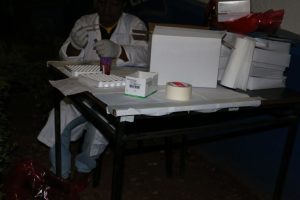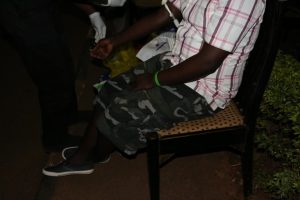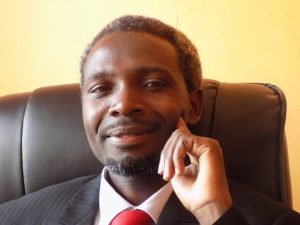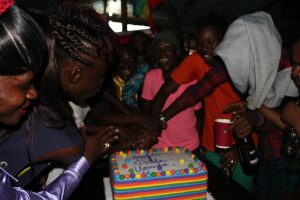 Spectrum Uganda together with Ice breakers Uganda, last week took health services to the people. The two organisations in conjunction with Alive Medical Service held a session at one of the very few gay friendly bars in Kampala where they extended health, counseling and testing services to LGBTI people.
Spectrum Uganda together with Ice breakers Uganda, last week took health services to the people. The two organisations in conjunction with Alive Medical Service held a session at one of the very few gay friendly bars in Kampala where they extended health, counseling and testing services to LGBTI people.
Every Sunday night, this gay sociable bar turns into a safe haven for many members from the gender and sexual minority movement in Uganda. It was therefore only opportune that the three mentioned organizations chose a Sunday to hold this special session at the bar.
According to recent and past studies conducted by different research firms, it is evident that there is a higher HIV prevalence rate among the key affected population groups especially men who have sex with men (MSM). According to “The HIV and AIDS Uganda Country Report 2014” by UNAIDS, released December 2011, the prevalence rate of HIV/AIDS among the cluster of men who have sex with men was 13.7%.
For many MSM, Uganda’s HIV epidemic brings with it significant social burdens. A pervading social stigma and high levels of homophobic violence caused by enduring conservative attitudes, result in MSM feeling less inclined to access HIV services. Only 44% of MSM living with HIV have ever been tested for the virus and know their results according to some surveys
The Uganda Anti-Homosexuality Act, passed by parliament on 20th December 2013 and officially signed into law on 24th February 2014 but later annulled on 1st August 2014 on procedural grounds, is thought to have resulted in an increased harassment and prosecution based on sexual orientation and gender identities. Uganda’s official adoption of new restrictive legislation has also triggered negative discussions from the general population via social media, in which violence and anti-gay discrimination were advocated. HIV outreach workers and services providers working with MSM in Uganda have also reported heightened challenges in reaching this population.
It is upon such background that many health oriented organizations have put special emphasis on the fight against HIV and other sexually transmitted diseases within the LGBTI community. Through advocacy, LGBTI organizations pushed for inclusion of sexual and gender minorities in the country’s health strategic programs and sensitized health workers from different health centres on various needs for these key affected populations. This has seen a significant improvement and a number of members from the Ugandan LGBTI and sex work communities access friendly and free health care services unlike in the past.
However the health seeking trend in the LGBTI community is still lacking and holding such community outreaches provides the community with an opportunity to access health services more easily.
Kuchu Times talked to Luswata Brant, the clinic and Resource Manager for Ice Breakers Uganda and he had this to say, “Our major goal is todeliver health services to everyone in order to bridge the gap for those that don’t find it comfortable visiting health centers and more so to bring health services closer to lesbian, gay, bisexual, transgender and intersex (LGBTI) people. Some individuals lack the means to get to health centers. Many young people also ignore the health services offered to them, so we have to revise means of reminding them to about the importance of knowing their health status”
Through this new street testing programme, health workers from Alive Medical offered free testing of HIV and other STDs and conducted counselling. Many community members who had gone to the bar for social purposes took the initiative to get tested and know their status. Spectrum Uganda and Ice Breakers Uganda also distributed free condoms and lubricants to those that took part in the exercise.





